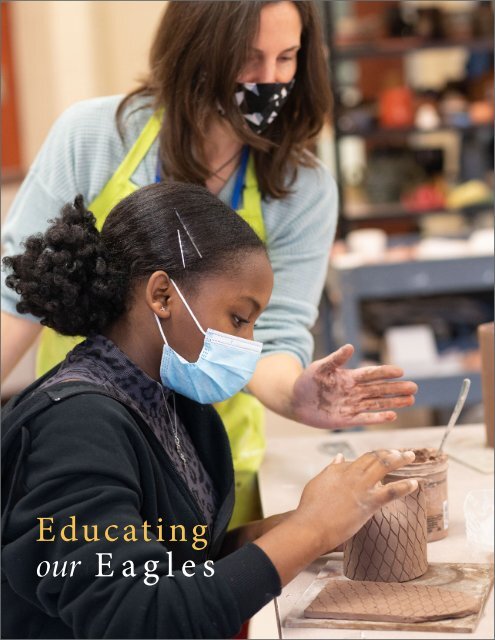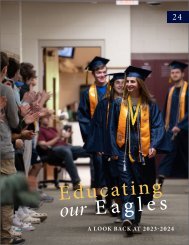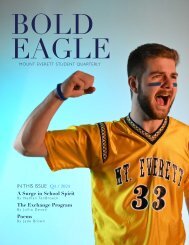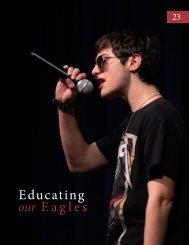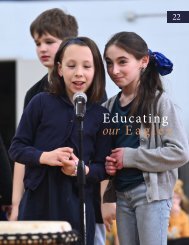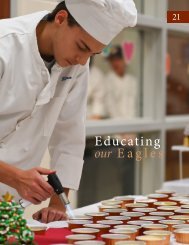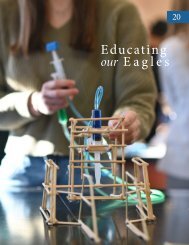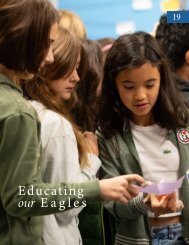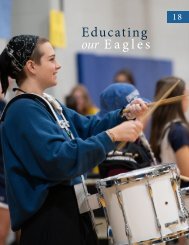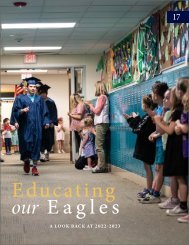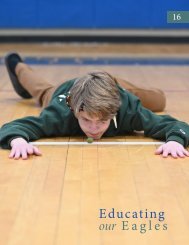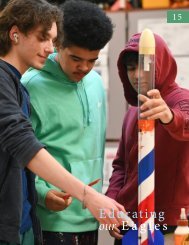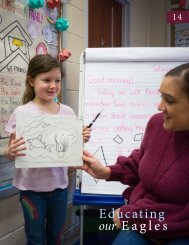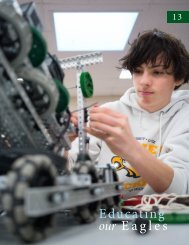Create successful ePaper yourself
Turn your PDF publications into a flip-book with our unique Google optimized e-Paper software.
<strong>Educating</strong><br />
our <strong>Eagles</strong>
CONTENTS<br />
4<br />
Introduction - Curriculum Director, Julie Dolan<br />
16<br />
6<br />
8<br />
10<br />
12<br />
13<br />
Fourth Grade - Weathering, Erosion,<br />
Deposition Hiking Trip with Dale Abrams<br />
<strong>–</strong> Amy Murray, Tina Kreis<br />
Ninth Grade - Créez votre bande dessinée<br />
<strong>–</strong> Pierre Leger<br />
Twelfth Grade - Research Paper <strong>–</strong> Victoria Aldam<br />
Seventh Grade - Night at the Museum<br />
<strong>–</strong> Andrew Rapport<br />
Ninth Grade - Fitness Game<br />
<strong>–</strong> Josh King<br />
14<br />
First Grade - Gingerbread Unit<br />
<strong>–</strong> Christina Carlson<br />
16<br />
First Grade - What's in Your Hot Cocoa<br />
<strong>–</strong> Ashley Lotz, Christina Carlson<br />
17<br />
Tenth Grade - Silver & Gold Oxidation/<br />
Reduction <strong>–</strong> Timothy Schwartz<br />
12<br />
13<br />
18<br />
Fifth Grade - Science/Water Filter Design<br />
Contest <strong>–</strong> Claudine Mallory<br />
EDUCATING OUR EAGLES<br />
2 EDUCATING OUR EAGLES 3
INTRODUCTION<br />
From SBRSD’s Director of Curriculum<br />
and Instruction, Julie Dolan<br />
Julie Dolan<br />
Director of Curriculum<br />
and Instruction<br />
A<br />
s I reflect over the past six months,<br />
being the Director of Curriculum<br />
and Instruction, I am amazed and<br />
proud of all the challenging work<br />
our staff has put into providing the<br />
best education possible for all our students. These<br />
have been trying times for all, but I am pleased to say<br />
our staff has stepped up and put student needs before<br />
their own; working tirelessly to meet their health,<br />
academic, and social emotional needs.<br />
As we are preparing for a much-needed winter break<br />
I encourage you to reach out and thank your<br />
student’s teachers for all they do, and I would like<br />
to thank all of you for your support in our mission<br />
to inspire all students to be resilient, curious, and<br />
ethical global citizens.<br />
I hope you enjoy this issue of “<strong>Educating</strong> <strong>Our</strong> <strong>Eagles</strong>”<br />
and as always, I am available to answer and discuss<br />
and curriculum questions you may have. You can<br />
reach me at Jdolan@sbrsd.org.<br />
Happy New Year!<br />
EDUCATING OUR EAGLES<br />
4 5
ELEMENTARY SCHOOL - FOURTH GRADE<br />
Weathering, Erosion, Deposition<br />
Hiking Trip with Dale Abrams<br />
Description:<br />
Students will be able to observe and identify examples of weathering, erosion, and<br />
deposition while hiking at Lime Kiln Sanctuary.<br />
Student Learning Goals/Outcomes:<br />
• Find evidence to support how the landscape has changed over time.<br />
• Make observations and collect data showing weathering (how rocks have broken into<br />
small pieces), erosion (the moving of those pieces), and deposition (dropping the material<br />
in a new location).<br />
Review:<br />
Students enjoyed the hands-on experience of being outside and discovering examples<br />
for themselves of what we were learning about in the classroom. A highlight was a huge<br />
boulder found in a field. We determined it was left there by a glacier many years ago.<br />
Frameworks:<br />
Earth & Space Sciences: Erosion, Weathering, Deposition 4-ESS1-1 and 4-ESS2-1<br />
EDUCATING OUR EAGLES<br />
6 EDUCATING OUR EAGLES 7
HIGH SCHOOL - NINTH GRADE<br />
Créez votre bande dessinée<br />
Description:<br />
Each year, the “Centre de la Francophonie des Amériques organizes an international contest.<br />
This year, our 9th grade students participated. Students were asked to create a visual narrative<br />
showcasing a character of their imagination, a (super)hero, an animal. The story had to take<br />
place in a francophone region of the Americas and students had to write dialogues including<br />
specific language expressions (idioms) used in the region where the story is taking place<br />
Student Learning Goals/Outcomes:<br />
As a result of instruction, students will be able to...<br />
• discover the francophone regions of the Americas: Quebec, Vermont, Maine, Louisiana,<br />
California, Caribbean islands, Haïti, French Guyana<br />
• discover the diversity of the French language within the Americas.<br />
• write a short story in French in the form of a visual narrative following specific steps:<br />
synopsis, scenario, dialogues, and finally the drawing.<br />
Review:<br />
Students had fun discovering and comparing various French idiomatic expressions with the<br />
ones they use every day in English. Students did not necessarily realize that idioms used in<br />
Louisiana were not used in Quebec or in the Caribbean and vice versa. Students had to be<br />
creative to come up with their story line and dialogues. Students were challenged in using<br />
idiomatic expression in context (narration or dialogues). Students had fun creating their<br />
visual narrative.<br />
MA Frameworks<br />
Presentational communication <strong>–</strong> Provide simple, basic, prepared information in culturally<br />
appropriate ways. (NM.3.b.)<br />
Comparisons <strong>–</strong> Investigate, explain, and reflect on the nature of culture through comparisons<br />
of the language studied and their own by comparing basic idiomatic expressions. (NM.6.b.2.<br />
EDUCATING OUR EAGLES<br />
8 EDUCATING OUR EAGLES 9
HIGH SCHOOL:<br />
Twelfth Grade Research Paper<br />
ELEMENTARY SCHOOL:<br />
Science/Water Filter Design Contest<br />
As a graduation requirement, every senior chooses a topic of their choice and develops a unique<br />
research question around that topic. The subjects vary by student interest and this year some<br />
interesting topics included the effects of different stimuli on the mind of a criminal, marine avionics,<br />
finding the root of systemic racism, and even grade inflation and critically analyzing the<br />
current public school grading system. Each student then uses class time and time in the computer<br />
lab to research, write, and revise. Students reviewed and received instruction on proper<br />
updated MLA requirements. Interdisciplinary collaboration with the librarian and library resources allows for<br />
up-to-date information to be provided to the students. At the end of the eight week-long project, students craft<br />
and submit a polished, complete, individual research paper up to ten pages in length.<br />
Fifth grade students evaluated filtering materials and built a water filter prototype to test<br />
their designs.<br />
As a result of instruction, students will be able to:<br />
• use the design process<br />
• evaluate materials<br />
• build, test and improve a prototype<br />
Observation:<br />
Students were proud of their work, and eager to assess their designs to make improvements .<br />
As a result of instruction, students will be able to:<br />
• complete sequential steps to writing a research paper.<br />
• demonstrate understanding of MLA methods in their research paper.<br />
• complete a well done, informative research paper.<br />
• include an MLA formatted Works Cited page.<br />
Observations:<br />
Students found success with the one-on-one and full group instruction models. Peer review practices and<br />
different revision strategies also proved helpful. Not only did students find the concrete rubrics and scaffolded<br />
milestones helpful for breaking up the large, multi-week project, they were also able to spend this time researching<br />
a topic of their choosing. By providing students with agency, the buy-in for the assignment is stronger. Often-times,<br />
the topics correspond with potential careers and continuing education majors, which is entirely fitting<br />
for these senior eagles about to leave the nest.<br />
A Selection of MA Standards:<br />
English Language Arts 6-12 (2017)<br />
Reading: Informational Text<br />
1. Read closely to determine what the text says explicitly and to make<br />
logical inferences from it; cite specific textual evidence when writing or<br />
speaking to support conclusions drawn from the text.<br />
Integration of Knowledge and Ideas<br />
7. Integrate and evaluate content presented in diverse formats and media,<br />
including visually and quantitatively, as well as in words.<br />
Range of Reading and Level of Text Complexity<br />
10.Independently and proficiently read and comprehend complex literary<br />
and informational texts independently and proficiently.<br />
Text Types and Purposes<br />
1. Write arguments to support claims in an analysis of substantive topics<br />
or texts, using valid reasoning and relevant and sufficient evidence.<br />
Production and Distribution of Writing<br />
4. Produce clear and coherent writing in which the development, organization,<br />
and style are appropriate to task, purpose, and audience.<br />
EDUCATING OUR EAGLES<br />
10 EDUCATING OUR EAGLES 11
MIDDLE SCHOOL:<br />
Night at the Museum<br />
W<br />
ellness tudents<br />
created a fitness<br />
board game<br />
based off of previous<br />
favorite<br />
games they have<br />
played (i.e. Monopoly, Life, Trouble, etc.)<br />
for a ninth grade Wellness project. They<br />
used knowledge from our fitness units to<br />
create a board game that included exercises,<br />
stretches, yoga poses, etc. that will be<br />
used in their game.<br />
HIGH SCHOOL<br />
Wellness: Fitness Board Game<br />
T<br />
7th grade was involved in a multidisciplinary<br />
unit this month. After watching the movie<br />
Night at the Museum, 7th graders worked in<br />
groups to create their own “Night at the Museum”.<br />
Students chose a night guard to star in<br />
their movie, then researched and chose any<br />
museum from anywhere in the world for their setting. In<br />
small teams they created a storyboard for their movie that<br />
included historical figures and scientific facts. Each story<br />
required a climax and resolution. Once again, this activity<br />
proved that group-work produces great results! We saw some<br />
very creative storyboards.<br />
Learning Outcomes:<br />
• Collaboration<br />
• History<br />
• Science<br />
As a result of instruction,<br />
students will be able to:<br />
• Student's will create a game<br />
geared towards physical fitness<br />
based on their previous knowledge<br />
and understanding of fitness.<br />
• Demonstrate understanding of<br />
physical fitness, strength training<br />
and conditioning.<br />
• Apply safe practices, rules, procedures,<br />
and sportsmanship etiquette<br />
in physical activity settings, including<br />
how to anticipate potentially<br />
dangerous consequences and outcomes<br />
of participation in physical<br />
activity.<br />
Observations:<br />
Student's worked well together in their<br />
groups they chose. They all seemed to<br />
enjoy creating a game with exercises and<br />
rules of the game to play. Overall there<br />
was excitement in the activity as it was<br />
something new we did this year.<br />
EDUCATING OUR EAGLES<br />
12 EDUCATING OUR EAGLES 13
ELEMENTARY SCHOOL:<br />
Gingerbread Unit<br />
Description:<br />
For the past few weeks, first graders have been reading Gingerbread Man stories and<br />
comparing and contrasting them. We celebrated this unit by writing and sharing our own<br />
Gingerbread stories.<br />
Student Learning Goals/Outcomes:<br />
Students...<br />
• applied knowledge of gingerbread stories to create their own story<br />
• used grade level writing and phonics skills<br />
• made sure their detailed picture matched the words in their story<br />
• shared with their classmates<br />
Review:<br />
The students did a great job being creative, applying what they know about the traditional<br />
story to make their own. They were very excited to share their stories to their peers.<br />
EDUCATING OUR EAGLES<br />
14 EDUCATING OUR EAGLES 15
ELEMENTARY SCHOOL:<br />
What is in your hot cocoa?<br />
HIGH SCHOOL:<br />
Holiday Ornaments<br />
Silver & Gold<br />
Holiday Oxidation/Reduction<br />
Tenth grade science students experimented<br />
with Oxidation/Reduction<br />
in a holiday-themed organic<br />
chemistry lesson.<br />
Student learning outcomes:<br />
• describe the process of oxidation/reduction and<br />
the formation of a patina.<br />
First grade gives monthly “family” homework assignments for students to complete with<br />
their family to support student and family engagement. The assignment for December<br />
was "What is in your hot cocoa?" where students and their families had to write clues of<br />
what they “hid” in their hot cocoa. Then, in class, the students read the clues and classmates<br />
guess what they hid.<br />
As a result of instruction, students will be able to:<br />
• create a home/school connection<br />
• increase student and family engagement<br />
• work on grade level writing and phonics skills<br />
• read and share writing with peers<br />
Observation:<br />
Students are amazed by the zinc removal via<br />
hydrochloric acid and the generation of the<br />
hydrogen gas bubbles. Some would like to set<br />
the hydrogen gas on fire but that is for another<br />
lesson.<br />
Observation:<br />
This project was a huge hit for the first graders and their families! They created very clever clues and<br />
stumped their classmates who guessed more times than not. The class was engaged and very good<br />
listeners as their classmates read the clues and called on friends to guess.<br />
EDUCATING OUR EAGLES<br />
16 EDUCATING OUR EAGLES 17
EDUCATING OUR EAGLES<br />
18


